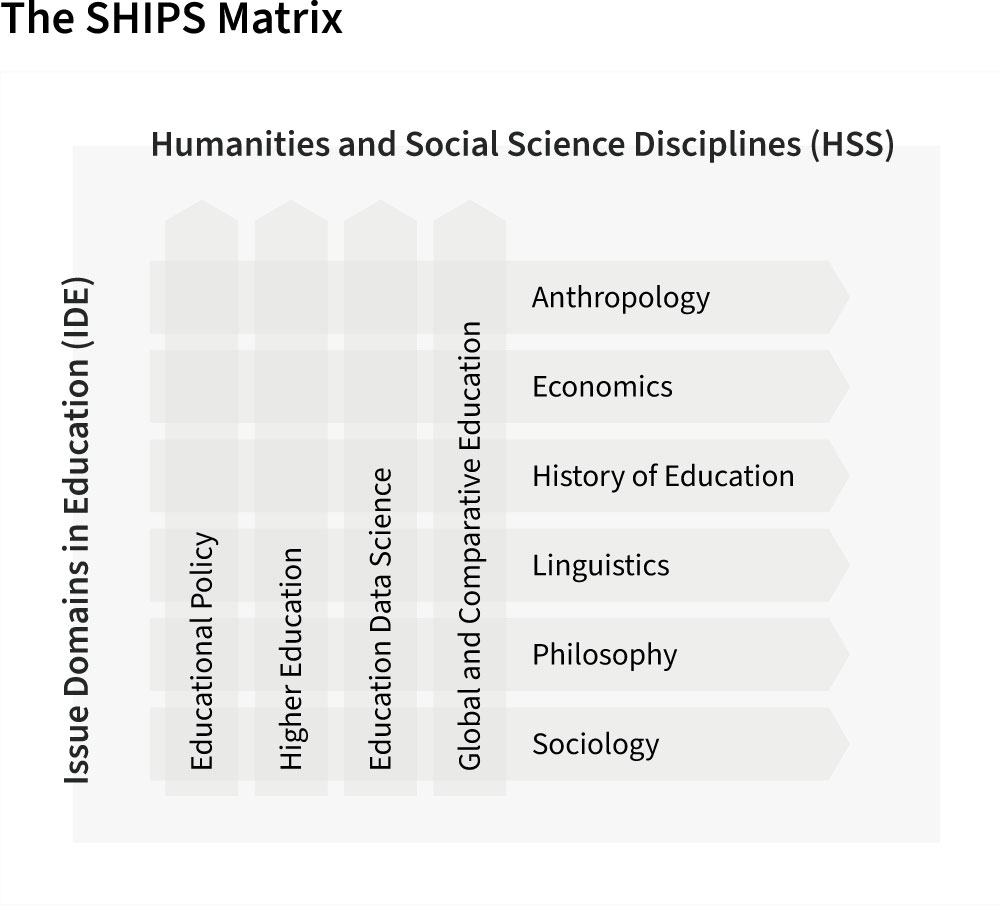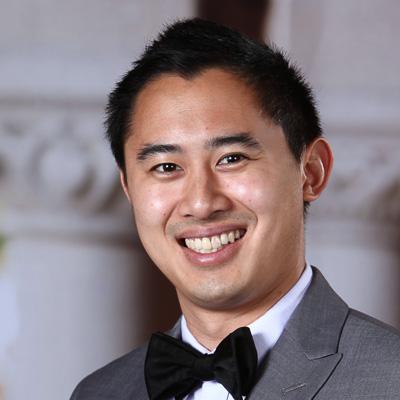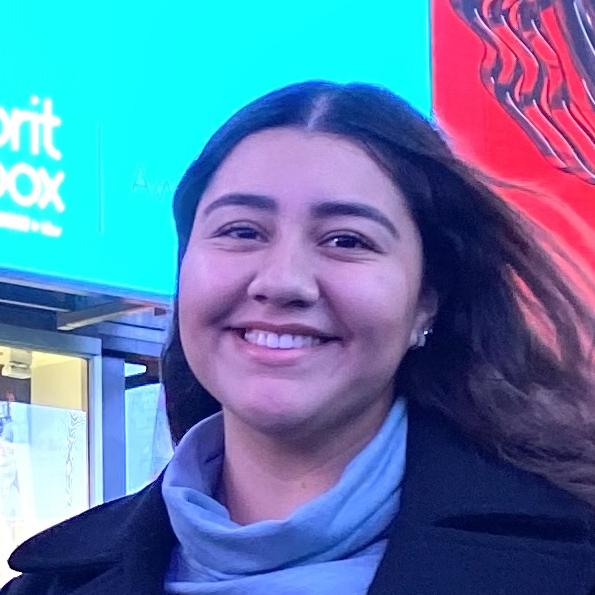
Social Sciences, Humanities, and Interdisciplinary Policy Studies in Education (SHIPS)
On this page:
The doctoral programs in SHIPS combine two kinds of approaches to research in education. One approach is disciplinary, in which we prepare students to study education issues from one of a wide array of disciplinary perspectives. We call this approach Humanities and Social Sciences in Education (HSS). These disciplinary perspectives include:
The other approach is issue based, in which we focus on major issue domains in education that are of particular salience to educational policy. We call this approach Issue Domains in Education (IDE). These issue domains include:
The power in the SHIPS approach to doctoral study is the way it opens up the possibilities for educational research that comes from combining the two approaches: deep expertise in a disciplinary tradition (HSS) applied to major issue areas in education (IDE).
The result is a SHIPS matrix:

All doctoral students in SHIPS may pursue one of three program options:
- A program in one of the six HSS disciplines
- A program in one of the four IDE areas
- A dual specialization in two of the aforementioned programs
Students in a cross-area program and specialization must (also) complete one of the three options above.
The dual-specialization option draws on the particular strengths of the SHIPS area within the GSE– combining disciplinary expertise and policy relevance, which allows students to apply a deep understanding of a single discipline to a major issue in educational policy. It also gives students a credible dual identity as scholars, which can be helpful in the job market. Students with a dual specialization will earn a Ph.D. from the GSE that lists both programs on the diploma. A key point is that pursuing the joint degree option does not entail taking more total units than pursuing either an HSS or IDE degree.
SHIPS Program Requirements
Humanistic and Social Science Disciplines in Education (HSS)
For students enrolling in one of the disciplinary programs within HSS:
- Normally a student will complete the equivalent of a master's program in an appropriate department (e.g., sociology, philosophy, economics, etc.).
- In addition, in consultation with the advisor and program committee, the student will construct a major course of studies in education appropriate to his or her disciplinary specialty from courses and individual studies offered within SHIPS, the GSE, and elsewhere on campus as needed.
- Students must pursue studies beyond the introductory level in one other field of HSS offered within the program.
- Students must meet GSE requirements.
- Beyond coursework, a research apprenticeship is required from each student, to obtain intensive training on an on-going project or undertake supervised fieldwork. If a student plans a career in college teaching, he or she is also encouraged to do some supervised teaching during the graduate career.
- Students completing one of the disciplinary concentrations in HSS will graduate with a degree in Anthropology and Education, Economics and Education, Educational Linguistics, History of Education, Philosophy and Education, or Sociology of Education.
Anthropology
- Students seeking careers as educational anthropologists should select a disciplinary orientation, and concentrate in the Anthropology of Education subconcentration. The PhD candidate in Anthropology of Education will take courses in the Department of Anthropology in addition to educational anthropology courses offered in the Graduate School of Education, for a combined total of at least 45 units. The course units in anthropology should include work in methodology, theory and its history, sociocultural and psychocultural processes, and ethnography. At least 20 units must be at the advanced graduate level. The 45 units of anthropology can be recognized as a PhD minor in anthropology or as a master's in the Anthropology Department.
Economics
- The program in Economics of Education aims to instill a thorough understanding of micro- and macro-economic analyses as they apply to the economics of education, a facility for using econometric modeling techniques to formulate complex relationships in education and to test such models with relevant data, and an acquaintance with the other social sciences as they relate to the economics of education.
- Specific areas of focus include the production, distribution, and financing of education; the relationship between education and labor markets; the contribution of education to economic growth and development; and the organization of the education industry.
- Students are expected to take courses in each of the following four areas: (1) economics and econometrics; (2) statistics; (3) education; and (4) related areas, including research-oriented courses in sociology, political science, psychology, anthropology, history, philosophy, mathematics, engineering-economic systems, and operations research.
- Knowing how to apply the tools of economics and econometrics to problems in education will prepare students for positions in universities, research institutions, and government.
History of Education
- A historian of education needs to be well trained in history and knowledgeable about education. By taking coursework in history and history of education—normally earning a master's in history along the way-students gain skill in asking productive questions, finding and organizing evidence, and presenting convincing historical arguments. In addition, students take a range of courses in education that introduce them to important issues and strategies for research. The aim of this specialization is to prepare historians of education who will be rigorous, imaginative, and knowledgeable teachers and researchers. Graduates often find their training helpful in policy analysis and in fields like academic administration.
Linguistics
- The program in Educational Linguistics is interdisciplinary and draws substantially upon courses, faculty, and programs in various areas throughout Stanford GSE as well as departments within the School of Humanities and Sciences. Building upon a common core of linguistic foundations, graduates of the program in educational linguistics integrate theory, research, policy, and practices that are central to studies of language development and usage in schools and their surrounding communities.
Philosophy
- The Philosophy of Education program trains scholars that will be able
- analyze and clarify concepts and chains of reasoning used by teachers, researchers, administrators, and policymakers;
- assess arguments and clarify the rhetoric of educational debates;
- identify implicit assumptions in such arguments or statements;
- enter into productive exchange with researchers or policymakers in at least one branch of social or human science; and
- place educational issues, and issues arising from the social sciences, into a broader philosophical and sociocultural context.
- Graduates of this subconcentration traditionally become college or university professors of the philosophy of education in departments or schools of education. However, a few graduates have secured joint or courtesy appointments in a school of education and a department of philosophy because of the intensive training in the minor field of general philosophy (many students take a master's degree in philosophy or philosophy of science).
Sociology
- The Sociology of Education program offers students invaluable research apprenticeship opportunities that take advantage of faculty interests and expertise at Stanford. Areas of emphasis include
- analysis of interpersonal dynamics in classrooms and schools
- the sociology of development and peer cultures
- the effects of organizational characteristics of schools and universities
- transfer of knowledge and organizational learning
- stratification within education and society
- comparative macrosociology of education
- Doctoral candidates in Sociology of Education ordinarily earn a master's degree in sociology and take advanced coursework in statistics. Doctoral students emerging from this specialization typically become faculty members at universities and carry on activities such as teaching sociology and education courses, training researchers, carrying out applied and basic research, and consulting.
Issue Domains in Education (IDE)
Education Data Science
The program in Education Data Science serves students looking to employ modern data science analyses and computational methods to solve the world’s greatest educational challenges. It offers training in data science skills anchored in educational data, applications, and concerns. Analytically, students are expected to become familiar with statistics, programming languages, computational methods (machine learning, data mining), data visualization, and specialized analytic concerns, such as relational and textual data (network science and text analysis). These skill sets enable students to perform state-of-the-art analyses salient to digital data found in most educational, organizational and web-based companies.
Students will take coursework focused on key data science principles, topics and applications common to the use of data science in education contexts to ensure that they attain a common cohesive base of knowledge and skills with which to pursue academic areas of interest and specialization tracks later in their course plan. Students will also complete data science specializations in their course of study. The areas of specialization are Natural Language Processing, Network Science, Experiments & Causal Methods, Measurement, and Learning Analytics.
Subplan Requirements
Students are required to complete a minimum of 5 courses: 2 education data science core courses, and a minimum of 3 data science specialization courses (1 course each in 3 specializations).
Education Data Science Core Sequence
Central to the curriculum are two required courses uniquely focused on key data science principles, topics and applications common to the use of data science in education contexts. These courses are EDUC 423A: Introduction to Data Management and EDUC 423B: Introduction to Data Science. These courses ensure that students attain a common cohesive base of knowledge and skills with which to pursue academic areas of interest and specialization tracks later in their course plan.
Should a student already possess the background to pursue more advanced courses, potential substitutions should cover data management, data mining, and machine learning:
Data management & mining (choose 1)
Introduction/machine learning (choose 1)
Offered in 2025-2026 Autumn (Andrew Ng, Carlos Guestrin, Moses Charikar, Amy Guan, Andrew Shi, Andy Tang, Ava Kouhana, Hercy Shen, Hongyue Li, Liam O'Carroll, Mayee Chen, Nikhil Lyles, Salman Abdullah, Simran Nayak, Stephen Tian, Tae Yang, Zhenyu Zhang) (3-4)
Offered in 2025-2026 Winter (Sanmi Koyejo, Andrew Shi, Emily Fox, Hercy Shen, Michael Li, Salman Abdullah, Shreyas Agarwal, Suchir Agarwal, Tae Yang, Yash Kankariya, Yash Satish Dave) (3-4)
Offered in 2025-2026 Spring (Chris Re, Tengyu Ma) (3-4)
Data Science Specializations
Students will also complete data science specializations in their course of study. Students will fulfill this requirement by completing at least one course in three of five available tracks (See Table 1 below). The areas of concentration that will be offered are Natural Language Processing, Network Science, Experiments & Causal Methods, Measurement, and Learning Analytics. These courses are established courses at Stanford University and will allow for inter-professional education of GSE students and graduate students from other departments. We anticipate that these tracks may change overtime with advances in data science.
Table 1: Overview of Specialization Tracks
Natural Language Processing: Introductory
Natural Language Processing: Advanced
Network Science: Introductory
Network Science: Advanced
Experiments / Casual Methods: Introductory
Experiments / Casual Methods: Advanced
Measurement: Introductory
Measurement: Advanced
Learning Analytics: Introductory
Learning Analytics: Advanced
Educational Policy
For students enrolling in the program in Education Policy:
- In consultation with the advisor and program committee, the student will construct a major course of studies in education appropriate to his or her program interests in Educational Policy from courses and individual studies offered within SHIPS, the GSE, and elsewhere on campus as needed.
- This program should include at least one course in each of the four main areas within the program: economics, sociology/organization studies, policy, and history.
- Students must pursue a minor or master's outside the GSE. This can either be a departmental minor, under the terms defined by the appropriate department, or an Individually Designed Distributed Minor. Both require substantial coursework from a department or school within Stanford but outside of the GSE.
- Students must meet GSE requirements.
- Beyond coursework, a research apprenticeship is required from each student, to obtain intensive training on an on-going project or undertake supervised fieldwork. If a student plans a career in college teaching, he or she is encouraged to do some supervised teaching during the graduate career.
- Students completing this program will graduate with a degree in Educational Policy.
Higher Education
For students enrolling in the program in Higher Education:
- In consultation with the advisor and program committee, the student will construct a major course of studies in education appropriate to his or her program interests in Higher Education Policy from courses and individual studies offered within SHIPS, the GSE, and elsewhere on campus as needed.
- This program should include the following three courses:
- EDUC 265/165 - History of Higher Education
- EDUC 347 - Economics of Higher Education
- EDUC 355 - Higher Education and Society
- In addition students must take two electives in higher education.
- ED 346 – Research Seminar in Higher Education – is not required but is strongly recommended for students who have not had previous training in higher education.
- Students must pursue a minor or master's outside the GSE. This can either be a departmental minor, under the terms defined by the appropriate department, or an Individually Designed Distributed Minor. Both require substantial coursework from a department or school within Stanford but outside of the GSE.
- Students must meet GSE requirements.
- Beyond coursework, a research apprenticeship is required from each student, to obtain intensive training on an on-going project or undertake supervised fieldwork. If students plan a career in college teaching, they are encouraged to do some supervised teaching during the graduate career.
- Students completing this program will graduate with a degree in Higher Education.
Course offerings within Higher Education:
Global and Comparative Education
For students enrolling in the program in Global and Comparative Education (GCE):
- In consultation with the advisor and program committee, the student will construct a major course of studies in education appropriate to his or her program interests in Global and Comparative Education from courses and individual studies offered within SHIPS, the GSE, and elsewhere on campus as needed.
- This program should include the following courses:
- EDUC 202 - Introduction to Global and and Comparative Education
- EDUC 306A and 306D - GCE core sequence on education and development (EDUC 306B is recommended but not required)
- Students must pursue a minor or master's outside the GSE. This can either be a departmental minor, under the terms defined by the appropriate department, or an Individually Designed Distributed Minor. Both require substantial coursework from a department or school within Stanford but outside of the GSE.
- Students must meet GSE requirements.
- Beyond coursework, a research apprenticeship is required from each student, to obtain intensive training on an on-going project or undertake supervised fieldwork. If students plan a career in college teaching, they are encouraged to do some supervised teaching during the graduate career.
- Students completing this program will graduate with a degree in Global and Comparative Education.
Course offerings within Global and Comparative Education:
Dual Specialization in HSS and IDE
For students enrolling in a joint degree program including one program in HSS and one in IDE:
- In consultation with the advisor and program committee, the student will construct a program that meets the requirements of both his or her HSS program and his or her IDE program.
- Students must meet School of Education distribution requirements.
- Beyond coursework, a research apprenticeship is required from each student, to obtain intensive training on an on-going project or undertake supervised fieldwork. If students plan a career in college teaching, they are encouraged to do some supervised teaching during the graduate career.
- The dual degree program will require no more units in total than a program in HSS or IDE.
- Students completing this program will graduate with a degree listing both areas of specialization, one in HSS and the other in IDE.
First-Year Review
During the third quarter of enrollment, usually the Spring Quarter of the first year, in the program, each student shall submit a portfolio containing:
- A preliminary Graduate Study Program (GSP) signed by the advisor.
- An unofficial transcript from AXESS.
- An explanation of any "incompletes" and when the incompletes will be removed.
- A finalized plan for a doctoral minor or a disciplinary master's (as appropriate).
- Copies of two class papers to illustrate writing and analytic abilities.
- Three copies of a short (2-3 pages) statement of purpose describing the rationale for the proposed GSP including future research interests and plans.
A copy of the portfolio should be submitted to each Review Committee member individually at least two weeks before the Review date.
There should be a face-to-face meeting between the student and a committee made up of two or three faculty members. The number of committee members is up to the discretion of the advisor. One member should normally be the program advisor; the other one or two members should, if possible, be acquainted with the student's class work, or work as an RA). At least two members of the committee must be GSE academic council faculty. See the Committee Composition requirements. The SHIPS First-Year Review committee is a special case that permits two faculty members instead of the usual three. After the review meeting, the student will submit the signed SHIPS first-year review form and preliminary GSP to the Doctoral Programs Officer. After these documents are submitted, the results of the first-year review will be posted on the student's record on Axess.
Only in extreme cases, a student can petition for an extension of the deadline for the First-Year Review (see the First-Year Review section). The petition should be endorsed by the faculty advisor, and it will be considered by the SHIPS Area Committee in Executive Session.
Second-Year Review (Qualifying Review)
During the sixth quarter of enrollment, normally the Spring Quarter of the second year, in the doctoral program, students shall submit a portfolio containing:
- An unofficial transcript from AXESS.
- A final Graduate Study Program (GSP) ready for approval by the advisor and Area Committee.
- A copy of the Qualifying Paper (QP).
- View an example of a Qualifying Paper (QP): Example of a Qualifying Paper (QP)
A copy of the portfolio should be submitted to each Review Committee member individually at least two weeks before the Review date.
The QP shall be read by three faculty members (one being the advisor, and the other two either assigned by the advisor or by the Area Chair). The Second-Year Review committee must have at least three faculty members (see the Committee Composition section).
The QP and the rest of the portfolio will be discussed with the student in a review meeting no later than a few days before the final SHIPS Area Committee meeting of Spring Quarter with the three faculty readers who comprise the Review Committee. The faculty will have reviewed in advance the qualifying paper and the portfolio. The QP will be deemed one of the following: acceptable as is; acceptable with minor revisions or addendum; acceptable if a revised and resubmitted paper is approved by the committee; or unacceptable. After the review meeting, the student will submit the signed SHIPS second-year review form and final GSP to the Doctoral Programs Officer. After these documents are submitted, the results of the second-year review will be posted on the student's record in Axess. If the results are favorable, the student will be eligible for advancement to candidacy as soon as they submit a signed and completed Application for Doctoral Candidacy (all forms available on the GSE Website, under current students>forms). If the results of the Review are unacceptable, the advisor should confer with the Area Chair and the Associate Dean of Educational Affairs on the appropriate course of action.
See the Second-Year Review section of the handbook for more details on the second year review, including the expected timeframe and procedure for requesting extensions.
Dissertation Proposal Hearing
Doctoral students are expected to complete a dissertation proposal during the fourth year. Students who plan to do extensive field research should plan to complete the proposal by the end of the third year.
- View an example of a Dissertation Proposal: Example of a PhD Proposal
Contact us
PhD students, please contact:

MA POLS and MA/PP students, please contact:

EDS, Individually Designed, LDT, MA/JD, students, please contact:

GCE/IEPA MA, MA/MBA students, please contact:

